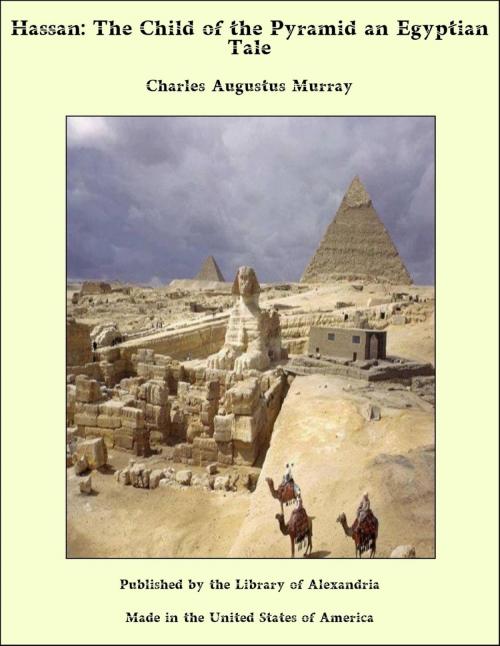Hassan: The Child of the Pyramid an Egyptian Tale
Nonfiction, Religion & Spirituality, New Age, History, Fiction & Literature| Author: | Charles Augustus Murray | ISBN: | 9781465607799 |
| Publisher: | Library of Alexandria | Publication: | March 8, 2015 |
| Imprint: | Language: | English |
| Author: | Charles Augustus Murray |
| ISBN: | 9781465607799 |
| Publisher: | Library of Alexandria |
| Publication: | March 8, 2015 |
| Imprint: | |
| Language: | English |
More than thirty years have elapsed since, on a summer evening, the tents of an Arab encampment might have been seen dotting the plain which forms the western boundary of the Egyptian province of Bahyrah, a district bordering on the great Libyan desert, and extending northward as far as the shore of the Mediterranean. The western portion of this province has been for many years, and probably still is, the camping-ground of the powerful and warlike tribe of the “Sons of Ali”; a branch of which tribe, acknowledging as its chief Sheik Sâleh el-Ghazy, occupied the encampment above referred to. The evening was calm and still, and lovely as childhood’s sleep: no sound of rolling wheel, or distant anvil, or busy mill, or of the thousand other accessories of human labour, intruded harshly on the ear. Within the encampment there was indeed the “watch-dog’s honest bark,” the voices of women and children, mingled with the deeper tones of the evening prayer uttered by many a robed figure worshipping towards the east, but beyond it nought was to be heard save the tinkling of the bells of the home-coming flocks, and the soft western breeze whispering among the branches of the graceful palms its joy at having passed the regions of dreary sand. It seemed as if Nature herself were about to slumber, and were inviting man to share her rest. In front of his tent sat Sheik Sâleh, on a Turkish carpet, smoking his pipe in apparent forgetfulness that his left arm was bandaged and supported by a sling. At a little distance from him were his two favourite mares, each with a foal at her side, and farther off two or three score of goats, tethered in line to a kels, surrendering their milky stock to the expert fingers of two of the inmates of the Sheik’s harem; beyond these, several hundred sheep were taking their last nibble at the short herbs freshened by the evening dew; while in the distance might be seen a string of camels wending their slow and ungainly way homeward from the edge of the desert: the foremost ridden by an urchin not twelve years old, carolling at the utmost stretch of his lungs an ancient Arab ditty addressed by some despairing lover to the gazelle-eyes of his mistress.
More than thirty years have elapsed since, on a summer evening, the tents of an Arab encampment might have been seen dotting the plain which forms the western boundary of the Egyptian province of Bahyrah, a district bordering on the great Libyan desert, and extending northward as far as the shore of the Mediterranean. The western portion of this province has been for many years, and probably still is, the camping-ground of the powerful and warlike tribe of the “Sons of Ali”; a branch of which tribe, acknowledging as its chief Sheik Sâleh el-Ghazy, occupied the encampment above referred to. The evening was calm and still, and lovely as childhood’s sleep: no sound of rolling wheel, or distant anvil, or busy mill, or of the thousand other accessories of human labour, intruded harshly on the ear. Within the encampment there was indeed the “watch-dog’s honest bark,” the voices of women and children, mingled with the deeper tones of the evening prayer uttered by many a robed figure worshipping towards the east, but beyond it nought was to be heard save the tinkling of the bells of the home-coming flocks, and the soft western breeze whispering among the branches of the graceful palms its joy at having passed the regions of dreary sand. It seemed as if Nature herself were about to slumber, and were inviting man to share her rest. In front of his tent sat Sheik Sâleh, on a Turkish carpet, smoking his pipe in apparent forgetfulness that his left arm was bandaged and supported by a sling. At a little distance from him were his two favourite mares, each with a foal at her side, and farther off two or three score of goats, tethered in line to a kels, surrendering their milky stock to the expert fingers of two of the inmates of the Sheik’s harem; beyond these, several hundred sheep were taking their last nibble at the short herbs freshened by the evening dew; while in the distance might be seen a string of camels wending their slow and ungainly way homeward from the edge of the desert: the foremost ridden by an urchin not twelve years old, carolling at the utmost stretch of his lungs an ancient Arab ditty addressed by some despairing lover to the gazelle-eyes of his mistress.















